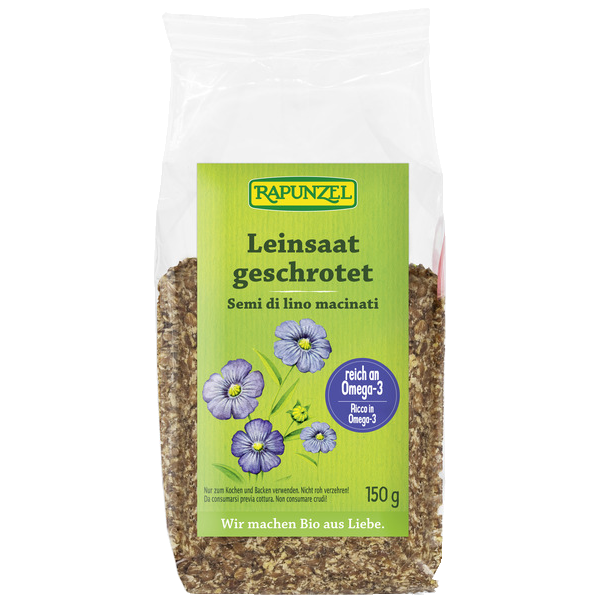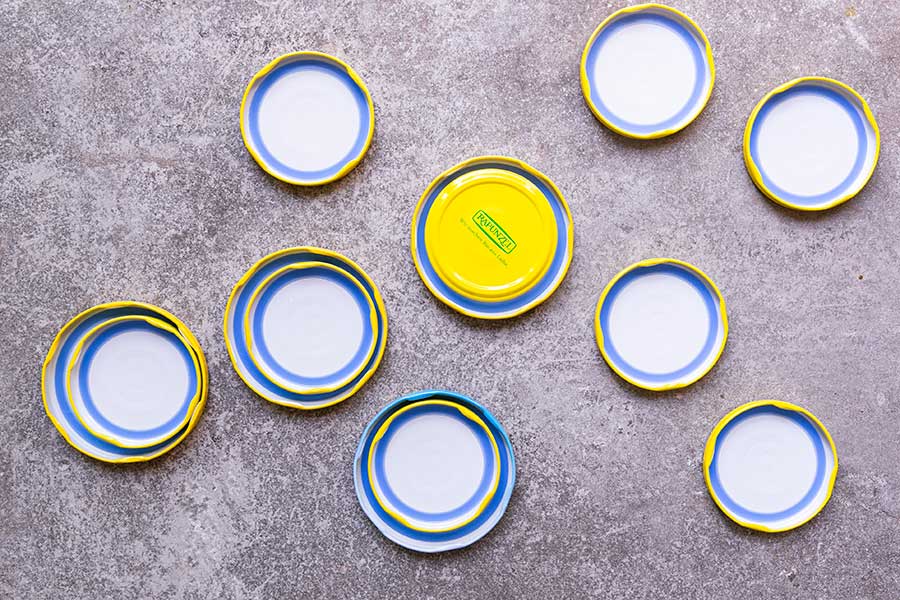Mild, nutty flavor and particularly rich in dietary fiber and valuable omega-3-fatty acids. In their crushed form, the linseed substances can be particularly well absorbed. The Rapunzel linseed are cultivated in Italy. They are freshly crushed and packed in a protective atmosphere by Rapunzel.
Ingredients
linseed*
* = ingredients from organic farming
** = from biodynamic agriculture
linseed*
* = ingredients from organic farming
** = from biodynamic agriculture
Characteristics
cultivated in Europe, produced in-house by Rapunzel
Usage
Ideal to bake and cook sweet and savory dishes. Can also be used as egg substitute in cooked dishes (for 1 egg: mix 1 tablespoon of seeds with 3 tablespoons of warm water and let rest for 10 mins). Due to their high swelling capacity, they should be consumed with plenty of liquid. Indication for consumption: Only to be used for cooking and baking. Do not consume raw! Max. 30g per day. Not suitable for children under 13 years of age.
cultivated in Europe, produced in-house by Rapunzel
Usage
Ideal to bake and cook sweet and savory dishes. Can also be used as egg substitute in cooked dishes (for 1 egg: mix 1 tablespoon of seeds with 3 tablespoons of warm water and let rest for 10 mins). Due to their high swelling capacity, they should be consumed with plenty of liquid. Indication for consumption: Only to be used for cooking and baking. Do not consume raw! Max. 30g per day. Not suitable for children under 13 years of age.
Additional information
Preparation
The linseed are harvested then freshly crushed at Rapunzel and immediately packed.
Produced in
Italy
Country of origin
italian agriculture
Origin of the main ingredients
Italy
Quality
EU Bio-Logo
Storage advice
Keep tightly closed in a cool, dark and dry place.
Legal name of the food product
Linseed, crushed
| Calorific value | 2218 kJ / 538 kcal | |
| Fat | 42,50 g | |
| of which saturates | 5,10 g | |
| of which polyunsaturated | 28,20 g | |
| Carbohydrates | 2,00 g | |
| Sugar | 2,00 g | |
| Dietary fiber | 32,0 g | |
| Protein | 20,90 g | |
| Salt | 0,070 g |
| Linolenic acid | 22,00 g | |
| Alpha-Linolenic acid | 22,00 g |
Allergens
| Eggs and products thereof | not contained | |
| Peanuts and products thereof | not contained | |
| Fish and products thereof | not contained | |
| Cereals containing gluten or cereal products | Possible in traces | |
| Crustaceans and products thereof | not contained | |
| Milk and products thereof including lactose | not contained | |
| Lupins and products thereof | not contained | |
| Nuts and products thereof | not contained | |
| Celery and products thereof | not contained | |
| Mustard and products thereof | not contained | |
| Sesame seeds and products thereof | Possible in traces | |
| Soy and products thereof | not contained | |
| Sulfur dioxide or sulfites (more than 10mg/kg or 10 mg/l SO2) |
no | |
| Molluscs and products thereof | not contained |
Mit großer Sorgfalt pflegen wir unsere Online-Produktdatenbank. Dennoch können wir vereinzelte Fehler nicht ausschließen. Daher bitten wir Sie, diese Angaben immer mit dem Etikett des jeweiligen Produktes zu vergleichen. Sollten Ihnen Unstimmigkeiten auffallen, sind wir dankbar für einen Hinweis an kundenservice@rapunzel.de.
FAQ about Linseed crushed
In the case of organic cereal products, despite intensive labour input during cultivation and intensive cleaning measures, the presence of foreign seeds cannot be completely ruled out, nor can products with optical deviations.
The colour of a grain or seed in cereals, legumes and oilseeds varies from harvest to harvest due to many factors such as soil conditions, climate and weather. Since we work with many small farmers from different growing areas, the products are exposed to different influences that lead to natural colour variations. Extreme weather conditions can cause such severe optical changes that it is no longer possible to sort out grains and seeds at a reasonable economic cost. However, as we value long-term economic cooperation with the small farmers, we also buy the harvest in difficult years and try to use it in the best possible way.
No herbicides are used in the organic sector. Thus, in some cases, even weed seeds of the same weight or size are very difficult to remove from the product.
Of course, these products are subject to particularly intensive controls by us and are only traded if it is a purely visual problem, without any effects in terms of taste and nutritional quality.
We are trying to further improve our possibilities for mechanical cleaning, but this is sometimes very difficult due to physical limits (e.g., 0.5 mm amaranth).
mehr erfahren
mehr erfahren
mehr erfahren
mehr erfahren
Since 01.01.2023, new legislation applies to linseed. The background to this is that, in addition to many valuable ingredients, the seeds also naturally contain so-called cyanogenic glycosides. For these, limit values have now been set for the first time and a consumption notice defined for the front of the packaging.
Cyanogenic glycosides occur naturally in varying concentrations in many food plants (e.g., also in bitter almonds, apricot kernels, garden beans, etc.). They protect the plant from pests. Under certain circumstances, prussic acid (more precisely cyanide, the salt of prussic acid) can be formed from these, which leads to adverse health effects if consumed in large quantities.
The content of cyanogenic glycosides varies due to many factors, such as different climatic conditions, growing periods, soil conditions, etc. A linseed that is completely free of cyanogenic glycosides does not occur in nature. Of course, at Rapunzel we also subjected the seeds to strict self-monitoring before the new legislation.
With the new consumption advice “Use only for cooking and baking. Do not eat raw!” we comply with the new declaration obligation. The prussic acid evaporates during cooking and baking.
It should be emphasised that nothing has changed in linseed itself since the law was changed.
We recommend not to exceed 30 g of linseed per day. Linseed is not suitable for children under 13 years of age.
Other products containing linseed, such as mueslis, porridges, seed mix and linseed oil are not affected by the new labelling. Of course, these articles are also subject to strict controls at Rapunzel. The limit values are always complied with for all linseed items. Linseed oil is free of cyanogenic glycosides due to the production process.
mehr erfahren
mehr erfahren
Recipes with Linseed crushed
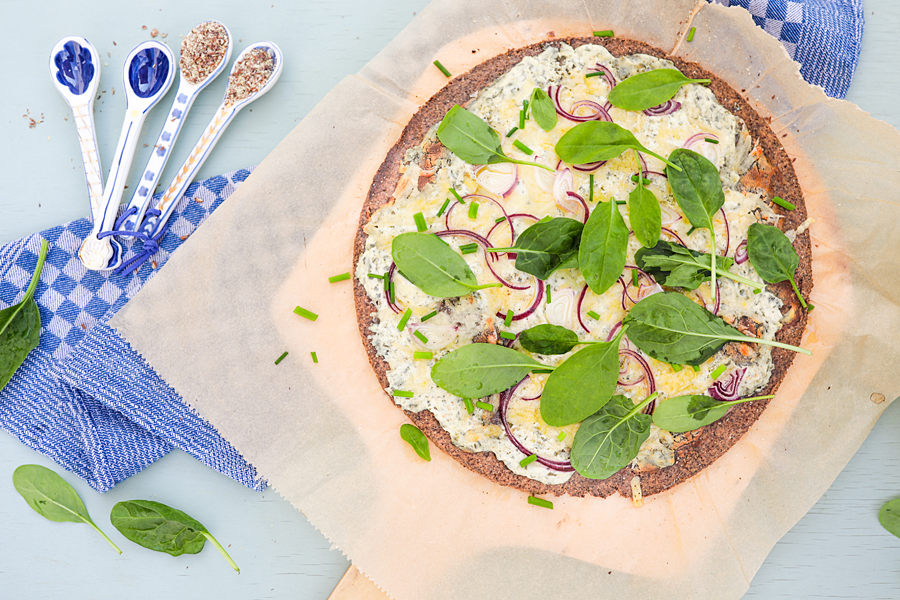
Linseed tart, low carb

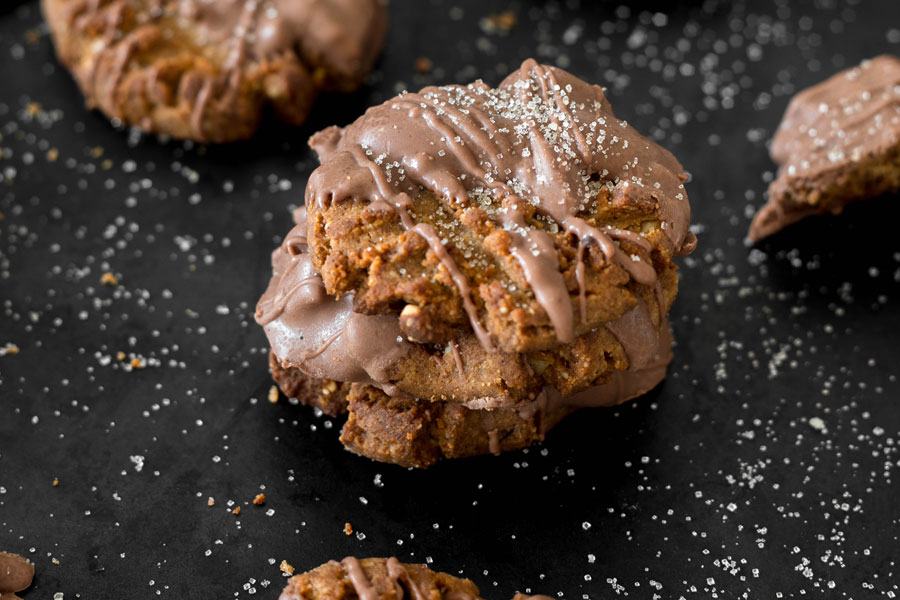
Date and Peanut butter cookies with a chocolate glaze

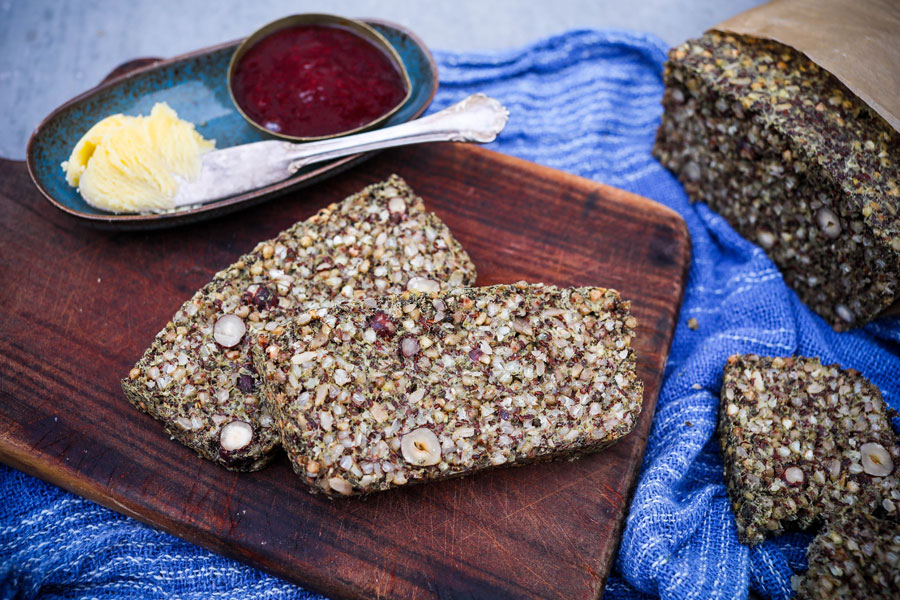
Seed Bread with Pumpkin Seed Flour and Buckwheat

